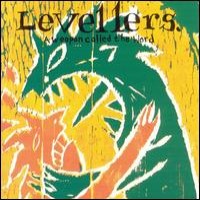I'm a bit puzzled, to be honest, over why I seem to be the first person to submit a Levellers review to Punknews. Could it be that their blend of old-school, Clash-style punk and traditional folk isn't quite punk enough? Yet Billy Bragg and the Pogues, both direct influences on the Levs and their music, are reviewed on here without issue, as is Frank Turner, who admits to being hugely influenced by them. Maybe it's that their green-anarchist political messages, and their flirtation with mainstream commercial success in the mid-nineties, lead to Levs fans being dismissed in some quarters as hippies, crusties and vacuous indie kids. But having been to many of their gigs, I've seen any number of punks and skinheads in attendance. At one live show I lost count of the number of mohicans that poked above the wildly pogoing crowd.
So. Could it be that if you live in North America, you've almost certainly never heard of them? The band, despite having enjoyed considerable success in the UK and Europe, rarely cross the Atlantic to tour, and have never met with much acclaim on the occasions that they have done.
Whatever the reason, Levellers have proven their punk credentials time and time again. Formed in 1988 in the town of Brighton on the south coast of England, they began with a punk sound reminiscent of the Clash and the Sex Pistols, before bringing violinist Jon Sevink on board to provide a sound more like the folk-punk of the Pogues and fellow Brighton-based band McDermott's Two Hours. Sharing a common interest in left-wing politics, they began to write protest songs chronicling the decline of England in the Thatcher era, and the changing face of the world as the Cold War stumbled to its ignominious end. Their earliest work was documented in the 1989 EPs An Agreement of the People, All the Free Commons of England, Carry Me and Outside/Inside. The interest in these EPs led to the Musidisc label offering the band a contract, and in 1990, their first full-length album, A Weapon Called the Word was released.
Built around five of the songs from the EPs that were re-recorded for the album, A Weapon Called the Word is about as strong a debut album as you could wish for from any band. The searing violin of "World Freak Show," the album's only single, quickly sets the pace and tone of the whole record, as singer Mark Chadwick blasts the headlines and buzzwords he hears on the news each night as resembling a Victorian carnival ("there's no need for the tents and the cages now, the world comes to my eyes / in front of my TV circus, a freakshow in disguise"). Righteous anger? Soapbox ranting? Raging against the machine? It's all in here. The relatively upbeat "Outside/Inside" attacks the gulf between those "inside" the system and those "outside," while the acoustic "Barrel of a Gun" denounces the use of violence in the name of law and order. "I Have No Answers," "Blind Faith" and "England My Home" all largely concern the conservative government in Britain at the time and their monopoly of power, and the final track "What You Know" closes the album with a frantic folky description of alienation in the city.
With all of these songs, we're on the familiar territory of protest music; if you like your tunes fast with a bit of social conscience on the side, you can't go wrong here. But where the Levs really shine on A Weapon Called the Word is in the slower, more stripped-down tracks. "Carry Me" and "The Ballad of Robbie Jones" are both poignant expressions of friendship: the former a pledge to work together during hard times ("when you're standing by the roadside, and it's a long way to go / well, I'll carry you, if you'll carry me"); the latter a tale of a mate sent to fight in the Falklands War. "No Change" is another political song, carried entirely on violin and acoustic guitar, that bemoans how books, and even protest songs themselves, have failed to create the change the band wish to see in the world. It's powerful stuff, and no less angry for its laid-back tempo.
All in all, A Weapon Called the Word is Levellers' manifesto, setting out the band's musical style -- traditional English folk fused with the energy and anger of punk -- and their broadly left-wing political beliefs, with a mixture of songs that are never less than catchy and compelling. Though some of these songs are very much a product of their time, many are still sadly relevant in our current times of economic hardship, and flourishing conservative politics.
At this point in time, the band's best albums were still ahead of them, but of course, that's a tale for another review. For now, it's enough to say that if you're unfamiliar with their work, and a fan of Billy Bragg, the Pogues, modern folk-punk acts like Flogging Molly, or even just appreciative of political music, Levellers are an essential addition to your collection. A Weapon Called the Word is a good place to start, and may even provide some light in otherwise dark times.
